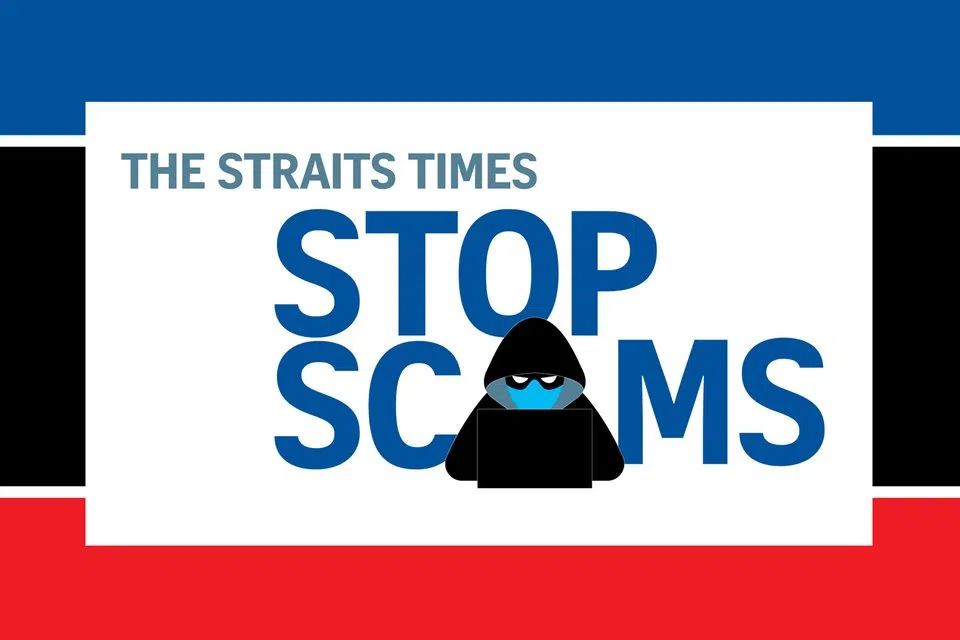New cyber-security campaign launched to remind public to Stop and Check suspicious messages, calls
Sign up now: Get ST's newsletters delivered to your inbox

Minister for Digital Development and Information Josephine Teo and Cyber Security Agency of Singapore chief executive David Koh taking a photo with cybersecurity mascot Jaga at the Cyber Safe in the City roadshow on Sept 13.
ST PHOTO: BRIAN TEO
- AI helps scammers create persuasive scams but also combats fraud by detecting threats, noted Josephine Teo.
- CSA's "Stop and Check" campaign urges people to verify suspicious messages and calls to avoid emotional manipulation.
- Cyber safety measures include two-factor authentication, strong passphrases, software updates, and using ScamShield.
AI generated
SINGAPORE - Even as artificial intelligence (AI) is being used to make scams more persuasive by playing on one’s emotions, it is also being used to tackle such crimes.
Minister for Digital Development and Information Josephine Teo said this on Sept 13 on the sidelines of the launch of the Cyber Security Agency of Singapore’s (CSA) sixth national cyber-security campaign, themed Stop and Check.
The campaign reminds the public to check unsolicited text messages and calls with official sources and trusted family and friends before responding to them.
This approach addresses ongoing scam threats, with impersonation tactics being of particular concern.
The campaign was launched at the two-day Cyber Safe in the City roadshow, held at Waterway Point in Punggol.
Mrs Teo said AI can be used to personalise scams and tailor them to trick specific individuals.
But she said AI can be used for good, noting the technology can comb through large amounts of data to detect potential threats, like finding websites that may have been created by scammers.
She said: “AI being used for cyber security, particularly for threat hunting, is one of the ways in which we can use this technology for good.”
In March, the CSA, the police and the Monetary Authority of Singapore warned of scams where AI was used to create deepfakes of high-ranking executives from companies where the victims work, instructing them to transfer funds from company accounts to the scammers.
Speaking at the event, CSA chief executive David Koh noted that in almost 80 per cent of reported scam cases, scammers preyed on emotions such as greed or fear to manipulate victims into transferring money.
He said it was important that people take a cognitive break to think clearly and avoid falling for scam tactics that try to pressure them to act quickly.
He added: “So, what we need to do is to take a pause, stop and check. Bring our emotions under control and evaluate the information logically.”
He advised the public to adopt cyber-safety measures such as enabling two-factor authentication and using strong passphrases. They should also promptly update software to address security issues and use the ScamShield app – which helps people filter scam messages and calls – and antivirus apps.
The roadshow, which will travel to other locations such as Bishan in the coming months, features settings such as cafes and schools, where visitors are taught good cyber hygiene habits like creating strong passphrases.
The campaign will include physical pop-ups across Singapore in 2026 as well as advertisements on TV and at bus shelters, in addition to digital platforms such as YouTube and TikTok.
A mascot, Jaga the cyber-security hedgehog, will feature prominently.

Originally introduced in 2017 by the Government Technology Agency to educate public sector officers on cyber-security, Jaga – named for the Malay word for “guard” – will now act as the cyber-security mascot for the community.
ST PHOTO: BRIAN TEO
Originally introduced in 2017 by the Government Technology Agency to educate public sector officers on cyber security, Jaga – named for the Malay word for “guard” – will now act as the cyber-security mascot for the community.
Mrs Teo noted that while the amount lost to scams had dropped from $522.4 million in the first half of 2024 to $456.4 million in the same period in 2025, it was too soon to say this was indicative of a downward trend, as scammers constantly change their tactics.
She said: “The one thing we have learnt about scammers is that they don’t stay still. They are constantly looking for new vulnerabilities.”




